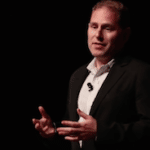Can Health Care be “Zillowed?”
 In this Guest Post, thought leader and Pediatric Rheumatologist Dr. Paul Rosen envisions the disruptive transformations—mostly for the better—when healthcare inevitably embraces the transparency and data-sharing that have transformed other industries.
In this Guest Post, thought leader and Pediatric Rheumatologist Dr. Paul Rosen envisions the disruptive transformations—mostly for the better—when healthcare inevitably embraces the transparency and data-sharing that have transformed other industries.
In their new book Zillow Talk: The New Rules of Real Estate, Zillow CEO Spencer Rascoff and Zillow chief economist Stan Humphries describe the results of their disruption of the real estate industry. Rascoff and Humphries use data collection and data sharing so that end-users have all the information they need to buy and sell their homes.
The valuable information that was once in secret databases of real estate professionals is now liberated and placed into the hands of the public. The data sharing and data analysis also results in the debunking of several real estate myths that are decades old such as:
- Myth 1: Pour money into a kitchen renovation as it will result in a large return on investment.
- Myth 2: Buy the worst house in the nicest neighborhood to maximize profits.
- Myth 3: Purchase a foreclosed home to generate the most value.
Zillow is a prime example of how delivering data to end-users in an innovative and transparent way can transform an industry. Amazon uses crowd ratings to deliver end-user surveys about products. Yelp shares crowd information to inform diners on their choices for restaurants. TripAdvisor harnesses the crowd’s input to inform travelers of their hotel options. There are hundreds of other websites that use input from end users, share data, and thus transform industry after industry.
Is health care next?
There are some signs that transparency and data sharing for the end-user (the patient) is possible.
I looked up myself (I am a pediatric rheumatologist) on HealthGrades.com and found that I had a five-star rating based on two respondents. Likewise, the partners in my practice each had less than 10 surveys. Traction in health care is not yet widespread but may be starting to develop.
A few health systems are tiptoeing into the world of sharing physician ratings transparently by posting the results of patient satisfaction surveys on their websites. These systems should be applauded for pushing health care into territory that Amazon, Yelp, TripAdvisor and Zillow executed years ago.
Skeptics may argue that choosing a doctor is not like, and should not be like, booking a restaurant or a vacation. However, patients report that online reviews influence their willingness to be treated by a doctor. Take this hypothetical case.
Your teenage daughter is having horrible migraines that are causing her to miss out on her sports and several days of school. Her grades are dropping and she is becoming socially isolated as she is griped with unrelenting pain several days a week.
Your pediatrician recommends a consultation with a pediatric neurologist to get the headaches under control. You call the neurology department at the children's hospital to find there are five neurologists. Which one do you make an appointment with? The one the receptionist recommends because she has the next available opening? The one your neighbor recommends?
What if you could visit the hospital website and see hundreds of reviews and comments about all five of the neurologists. What if Doctor A had a five-star rating based on patient reviews and Doctor B had a one-star rating? Would you want to have this information prior to booking your daughter’s appointment?
Many hospitals currently have this information, but have not yet made the leap of sharing it with their patients. Why not? What are we afraid of?
We know what will happen once the data is released. The crowd will up-vote the high performing physicians by scheduling appointments with them over other physicians. The patients would dictate which physician practices would thrive. This is threatening to many, especially physicians struggling to deliver an engaging patient experience,
With a $2.8 trillion industry--of which at least 30 percent is considered to be wasteful spending--change will be coming. The agents of change--the innovators and disruptors--are looking for their entry point into health care. From the entrepreneurs in Silicon Valley, to the health information technologists in the Northeast corridor, opportunities to disrupt and transform health care are emerging.
They know that open, crowd-sourced information has transformed other industries and it will work for health care as well. Skeptics who say that Zillow-like tactics are irrelevant for healthcare may be the same ones who refuse to make a purchase before reading the crowd reviews on Amazon.
What’s your view? We welcome your perspective and comments.
RELATED: Read our previous article and view Dr. Rosen’s thought provoking presentation at a local TEDx event in Wilmington, DE, titled: What Would Empathy-Based Healthcare Look Like?
-0-

Paul Rosen, MD
Nemours
Pediatric Rheumatologist Paul Rosen, MD is Clinical Director of Service and Operational Excellence at Nemours. He received a Masters of Public Health degree from Harvard University and a Masters of Medical Management degree from Carnegie Mellon University. Dr. Rosen’s interests include patient-physician communication, family-centered care, and the patient experience. He teaches medical students about improving the patient experience, and he serves as the faculty mentor for the physician executive leadership program for medical students at Sidney Kimmel Medical College at Thomas Jefferson University.
Related Articles:
Healthcare Disruptions: For Better or Worse?
Healthcare Consumerism: How to Avoid Being Left Behind
Is Your Hospital Brave Enough to Publish Online Physician Reviews?
The Disruption of Healthcare Has Already Begun
Physician Ratings & Reviews: Doctors Distrust Them and Patients Ignore Them









